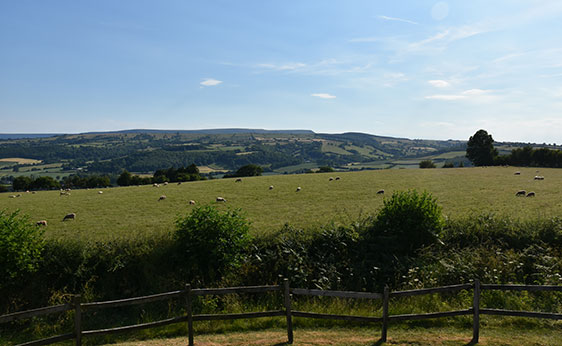All IFR field school applicants should familiarize themselves with IFR COVID-19 Practices before beginning the enrollment process. Program logistics are subject to change as health and risk management experts provide new recommendations and best practices. A Syllabus Addendum will be uploaded to each field school page and sent to all enrolled students with the latest logistical changes to their program.
Overview
Since 2010, the Beneath Hay Bluff Project has been investigating the character of prehistoric, and specifically Neolithic activity in southwest Herefordshire, or the border between modern England and Wales. This region has been somewhat neglected by prehistoric archaeology, in part owing to a lack of antiquarian investigations, but it is increasingly clear that it is distinguished by a rich and under-exploited prehistoric record. In seeking to address questions of monumentality, memory, place and material traditions, we have excavated at a number of sites, including the funerary round cairn at Olchon Court and the long mounds, buildings and causewayed enclosure of Dorstone Hill. The region is a rural one, with picturesque villages, castles, abbeys, rolling hills and lush river valleys: it is at once typically ‘English’ and bordering on rugged Welsh uplands. The field school provides a unique learning experience by drawing on the resources of both the University of Manchester and Herefordshire Archaeology. Many of our supervisory staff are professionals from the world of commercial archaeology, who bring a wealth of experience and know-how. As well as undertaking four weeks in the field, practicing excavation, recording and survey, students spend a week in the very different urban environment of Manchester, taking part in post-excavation tasks in the University laboratory, and visiting sites representative of the contrasting heritage of the world’s first industrial city. In the 2020 summer season, investigations in Herefordshire will focus on the megalithic tomb of Arthur’s Stone.
Instructors
The directors welcome emails and inquiries about the research elements of this project. More general information (tuition, health insurance, and payment schedule) can be found under the ‘Students’ tab above. Any further questions may be addressed to IFR staff. Additional details about research, course schedule, travel, accommodation, and safety can be found on the syllabus. Contacting the directors or the IFR office is encouraged and appreciated. It may help you determine if this field school is a good fit for you.
Testimonials
This is a new IFR field school. No student testimonials are available at this time.
Tuition Includes:
- Cost of Instruction
- Cost of Credit Units
- Room & Board
- All local transportation
- Health & Evacuation Insurance
Student Fees
This program requires an online application — there is a $25 fee to submit an application. Once admitted, a payment of the nonrefundable deposit fee is required to secure a place in the program(s). The Tuition balance (total program cost minus the deposit fee) must be paid prior to the Tuition deadline as listed above under “Course Details.” A $200 late fee will be added to all accounts not paid in full by the Tuition deadline.
Deposit: A nonrefundable $500 deposit fee is required to secure a seat in the program. This deposit is part of the total Tuition and NOT in addition to it.
Late Enrollment (payment deadline forward): A nonrefundable $600 deposit fee is required to secure a seat in the program. In addition, a $200 late fee will be added to all accounts not paid in full by the Tuition payment deadline.
Withdrawal & Cancellation Policy: If you paid the deposit fee but did not cancel your participation by the Tuition payment deadline, you are legally responsible for the full Tuition regardless of attendance at any IFR program. Please carefully read our Withdrawal & Cancellation Policy for further information.
Credit Card Processing Fee: A 3.5% processing fee is automatically incurred for all credit/debit card/online payments.
Academic Credit Opt Out: Students who wish to participate in an IFR field school without earning academic credit units may do so and receive the following discounts: $300 off a full program (4 or more weeks in length) or $200 off a short program (2-3 weeks in length).
Trip Cancellation Insurance: Please consider purchasing a travel interruption insurance policy that will cover your travel cost and the cost of the IFR program once you make a commitment to attend a field school.
Accommodations
Our campsite is the cricket field in Dorstone village, which we have exclusive use of during the fieldwork period. Participants camp in individual tents. There is a pavilion with showers and toilets, and another building used as a kitchen. During the fieldwork period we also have a large marquee for dining and social space, and at the bottom of the field, beside the stream, there is a space for a campfire.
Dorstone is a beautiful, traditional English village, with a fine pub (the Pandy Inn) that dates back to medieval times. Six miles away, across the Welsh border, is the small town of Hay on Wye, known for its castle and its many bookshops. Hereford is about sixteen miles distant, and the cathedral there holds the famous Mappa Mundi and a medieval chained library.
During fieldwork, our food is prepared by a cook employed by the project. There is a hot meal each evening, a variety of breakfast options, and a choice of sandwiches delivered to the site at lunchtime. We are happy to accommodate vegetarians, vegans, gluten-free, food allergies, halal, kosher and other diets.
During the fifth week of the five-week course, students will be accommodated in university halls of residence in Manchester. This final week will give you the opportunity to visit museums and places of interest in the city, alongside working on post-excavation tasks in the Archaeology laboratories.


Travel Info
We suggest you hold purchasing your airline ticket until six (6) weeks prior to departure date. Natural disasters, political changes, weather conditions and a range of other factors may require the cancelation of a field school. The IFR typically takes a close look at local conditions 6-7 weeks prior to program beginning and make Go/No Go decisions by then. Such time frame still allows the purchase deeply discounted airline tickets while protecting students from potential loss if airline ticket costs if we decide to cancel a program.
All students should arrange to arrive at Manchester International Airport (MAN) before 3:00 pm on Sunday July 5th, and to leave from the same airport on Saturday, August 8th. We will meet you at the airport, and drive by minibus direct to the project campsite in Dorstone village. This will be roughly a three-hour drive. You will be provided in advance with a cellphone number for your minibus driver, and details of a meeting point within the airport. On the day of departure, you will be going to the airport from student accommodation in Manchester.
If you missed your connection or your flight is delayed, please call, text or email project director immediately. A local emergency cell phone number will be provided to all enrolled students.
VISA REQUIREMENTS
To enter the United Kingdom, All U.S. citizens who do not also hold UK citizenship must present a valid U.S. passport to enter and depart. Your passport must be valid for the entire duration of your planned stay. U.S. and Canadian citizens can stay in the UK for up to 6 months, but check this frequently because regulations change, often with little notice.
Citizens of other countries are asked to check the embassy website page at their home country for specific visa requirements.
Student Safety
The IFR primary concern is with education. Traveling and conducting field research involve risk. Students interested in participating in IFR programs must weigh whether the potential risk is worth the value of education provided. While risk is inherent in everything we do, we do not take risk lightly. The IFR engages in intensive review of each field school location prior to approval. Once a program is accepted, the IFR reviews each program annually to make sure it complies with all our standards and policies, including student safety.
Students attending IFR international programs are covered by a comprehensive Health Insurance policy that includes physical illness or injury, mental or chronic conditions. No deductible and 100% of costs are covered up to $250,000. In addition, we provide Political and Natural Disaster Evacuation policy, which allow us to remove students from field school location if local conditions change. Our field school directors are scholars that know field school locations and cultures well and are plugged in into local communities and state institution structures.
Students attending IFR domestic programs (within the US) must have their own health insurance and provide proof upon enrollment. IFR field school directors are familiar with local authorities and if in need of evacuation, local emergency services and/or law enforcement will be notified and activated.
The IFR has strong, explicit and robust policy towards discrimination and harassment in the field. If students feel they cannot discuss personal safety issues with field school staff, the IFR operates an emergency hotline where students may contact IFR personnel directly.
Call us at 877-839-4374 or email us at info@ifrglobal.org if you have questions about the safety of any particular program.













